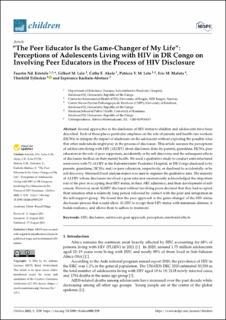| dc.contributor.author | Kitetele, Faustin Nd. | |
| dc.contributor.author | Lelo, Gilbert M. | |
| dc.contributor.author | Akele, Cathy E. | |
| dc.contributor.author | Lelo, Patricia Vangu Matondo | |
| dc.contributor.author | Mafuta, Eric M. | |
| dc.contributor.author | Tylleskär, Thorkild | |
| dc.contributor.author | Kashala-Abotnes, Espérance | |
| dc.date.accessioned | 2022-09-30T11:11:18Z | |
| dc.date.available | 2022-09-30T11:11:18Z | |
| dc.date.created | 2022-09-28T11:08:32Z | |
| dc.date.issued | 2022 | |
| dc.identifier.issn | 2227-9067 | |
| dc.identifier.uri | https://hdl.handle.net/11250/3022861 | |
| dc.description.abstract | Several approaches to the disclosure of HIV status to children and adolescents have been described. Each of these places particular emphasis on the role of parents and health care workers (HCWs) to mitigate the impact of disclosure on the adolescent without exploring the possible roles that other individuals might play in the process of disclosure. This article assesses the perceptions of adolescents living with HIV (ALHIV) about disclosure done by parents, guardians, HCWs, peer educators in the role of peer supporters, accidentally or by self-discovery, and the subsequent effects of disclosure method on their mental health. We used a qualitative study to conduct semi-structured interviews with 73 ALHIV at the Kalembelembe Paediatric Hospital, in DR Congo disclosed to by parents, guardians, HCWs, and/or peer educators, respectively, or disclosed to accidentally or by self-discovery. Microsoft Excel analysis matrix was used to organize the qualitative data. The majority of ALHIV whose disclosure involved a peer educator unanimously acknowledged the important role of the peer in accepting their HIV status, in their ART adherence, and their development of self-esteem. However, most ALHIV disclosed without involving peers declared that they had accepted their situation after a relatively long period followed by contact with the peer and integration in the self-support group. We found that the peer approach is the game-changer of the HIV status disclosure process that would allow ALHIV to accept their HIV status with minimum distress, it builds resilience, and allows them to adhere to treatment. | en_US |
| dc.language.iso | eng | en_US |
| dc.publisher | MDPI | en_US |
| dc.rights | Navngivelse 4.0 Internasjonal | * |
| dc.rights.uri | http://creativecommons.org/licenses/by/4.0/deed.no | * |
| dc.title | “The Peer Educator Is the Game-Changer of My Life”: Perceptions of Adolescents Living with HIV in DR Congo on Involving Peer Educators in the Process of HIV Disclosure | en_US |
| dc.type | Journal article | en_US |
| dc.type | Peer reviewed | en_US |
| dc.description.version | publishedVersion | en_US |
| dc.rights.holder | Copyright 2022 The Author(s) | en_US |
| dc.source.articlenumber | 1239 | en_US |
| cristin.ispublished | true | |
| cristin.fulltext | original | |
| cristin.qualitycode | 1 | |
| dc.identifier.doi | 10.3390/children9081239 | |
| dc.identifier.cristin | 2056267 | |
| dc.source.journal | Children | en_US |
| dc.identifier.citation | Children. 2022, 9 (8), 1239. | en_US |
| dc.source.volume | 9 | en_US |
| dc.source.issue | 8 | en_US |

